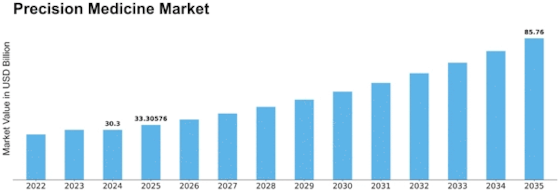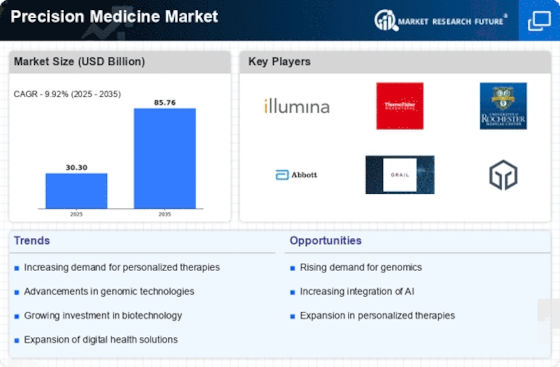Oncology
Cardiology
Neurology
Rare Diseases
Infectious Diseases
Genomics
Proteomics
Metabolomics
Microbiomics
Bioinformatics
Pharmaceutical Companies
Healthcare Institutions
Research Organizations
Diagnostic Laboratories
Diagnostic Tools
Therapeutics
Genetic Testing
Data Analytics Solutions
North America
Europe
South America
Asia Pacific
Middle East and Africa
North America Outlook (USD Billion, 2019-2035)
North America Precision Medicine Market by Application Type
Oncology
Cardiology
Neurology
Rare Diseases
Infectious Diseases
North America Precision Medicine Market by Technology Type
Genomics
Proteomics
Metabolomics
Microbiomics
Bioinformatics
North America Precision Medicine Market by End Use Type
Pharmaceutical Companies
Healthcare Institutions
Research Organizations
Diagnostic Laboratories
North America Precision Medicine Market by Product Type
Diagnostic Tools
Therapeutics
Genetic Testing
Data Analytics Solutions
North America Precision Medicine Market by Regional Type
US
Canada
US Outlook (USD Billion, 2019-2035)
US Precision Medicine Market by Application Type
Oncology
Cardiology
Neurology
Rare Diseases
Infectious Diseases
US Precision Medicine Market by Technology Type
Genomics
Proteomics
Metabolomics
Microbiomics
Bioinformatics
US Precision Medicine Market by End Use Type
Pharmaceutical Companies
Healthcare Institutions
Research Organizations
Diagnostic Laboratories
US Precision Medicine Market by Product Type
Diagnostic Tools
Therapeutics
Genetic Testing
Data Analytics Solutions
CANADA Outlook (USD Billion, 2019-2035)
CANADA Precision Medicine Market by Application Type
Oncology
Cardiology
Neurology
Rare Diseases
Infectious Diseases
CANADA Precision Medicine Market by Technology Type
Genomics
Proteomics
Metabolomics
Microbiomics
Bioinformatics
CANADA Precision Medicine Market by End Use Type
Pharmaceutical Companies
Healthcare Institutions
Research Organizations
Diagnostic Laboratories
CANADA Precision Medicine Market by Product Type
Diagnostic Tools
Therapeutics
Genetic Testing
Data Analytics Solutions
Europe Outlook (USD Billion, 2019-2035)
Europe Precision Medicine Market by Application Type
Oncology
Cardiology
Neurology
Rare Diseases
Infectious Diseases
Europe Precision Medicine Market by Technology Type
Genomics
Proteomics
Metabolomics
Microbiomics
Bioinformatics
Europe Precision Medicine Market by End Use Type
Pharmaceutical Companies
Healthcare Institutions
Research Organizations
Diagnostic Laboratories
Europe Precision Medicine Market by Product Type
Diagnostic Tools
Therapeutics
Genetic Testing
Data Analytics Solutions
Europe Precision Medicine Market by Regional Type
Germany
UK
France
Russia
Italy
Spain
Rest of Europe
GERMANY Outlook (USD Billion, 2019-2035)
GERMANY Precision Medicine Market by Application Type
Oncology
Cardiology
Neurology
Rare Diseases
Infectious Diseases
GERMANY Precision Medicine Market by Technology Type
Genomics
Proteomics
Metabolomics
Microbiomics
Bioinformatics
GERMANY Precision Medicine Market by End Use Type
Pharmaceutical Companies
Healthcare Institutions
Research Organizations
Diagnostic Laboratories
GERMANY Precision Medicine Market by Product Type
Diagnostic Tools
Therapeutics
Genetic Testing
Data Analytics Solutions
UK Outlook (USD Billion, 2019-2035)
UK Precision Medicine Market by Application Type
Oncology
Cardiology
Neurology
Rare Diseases
Infectious Diseases
UK Precision Medicine Market by Technology Type
Genomics
Proteomics
Metabolomics
Microbiomics
Bioinformatics
UK Precision Medicine Market by End Use Type
Pharmaceutical Companies
Healthcare Institutions
Research Organizations
Diagnostic Laboratories
UK Precision Medicine Market by Product Type
Diagnostic Tools
Therapeutics
Genetic Testing
Data Analytics Solutions
FRANCE Outlook (USD Billion, 2019-2035)
FRANCE Precision Medicine Market by Application Type
Oncology
Cardiology
Neurology
Rare Diseases
Infectious Diseases
FRANCE Precision Medicine Market by Technology Type
Genomics
Proteomics
Metabolomics
Microbiomics
Bioinformatics
FRANCE Precision Medicine Market by End Use Type
Pharmaceutical Companies
Healthcare Institutions
Research Organizations
Diagnostic Laboratories
FRANCE Precision Medicine Market by Product Type
Diagnostic Tools
Therapeutics
Genetic Testing
Data Analytics Solutions
RUSSIA Outlook (USD Billion, 2019-2035)
RUSSIA Precision Medicine Market by Application Type
Oncology
Cardiology
Neurology
Rare Diseases
Infectious Diseases
RUSSIA Precision Medicine Market by Technology Type
Genomics
Proteomics
Metabolomics
Microbiomics
Bioinformatics
RUSSIA Precision Medicine Market by End Use Type
Pharmaceutical Companies
Healthcare Institutions
Research Organizations
Diagnostic Laboratories
RUSSIA Precision Medicine Market by Product Type
Diagnostic Tools
Therapeutics
Genetic Testing
Data Analytics Solutions
ITALY Outlook (USD Billion, 2019-2035)
ITALY Precision Medicine Market by Application Type
Oncology
Cardiology
Neurology
Rare Diseases
Infectious Diseases
ITALY Precision Medicine Market by Technology Type
Genomics
Proteomics
Metabolomics
Microbiomics
Bioinformatics
ITALY Precision Medicine Market by End Use Type
Pharmaceutical Companies
Healthcare Institutions
Research Organizations
Diagnostic Laboratories
ITALY Precision Medicine Market by Product Type
Diagnostic Tools
Therapeutics
Genetic Testing
Data Analytics Solutions
SPAIN Outlook (USD Billion, 2019-2035)
SPAIN Precision Medicine Market by Application Type
Oncology
Cardiology
Neurology
Rare Diseases
Infectious Diseases
SPAIN Precision Medicine Market by Technology Type
Genomics
Proteomics
Metabolomics
Microbiomics
Bioinformatics
SPAIN Precision Medicine Market by End Use Type
Pharmaceutical Companies
Healthcare Institutions
Research Organizations
Diagnostic Laboratories
SPAIN Precision Medicine Market by Product Type
Diagnostic Tools
Therapeutics
Genetic Testing
Data Analytics Solutions
REST OF EUROPE Outlook (USD Billion, 2019-2035)
REST OF EUROPE Precision Medicine Market by Application Type
Oncology
Cardiology
Neurology
Rare Diseases
Infectious Diseases
REST OF EUROPE Precision Medicine Market by Technology Type
Genomics
Proteomics
Metabolomics
Microbiomics
Bioinformatics
REST OF EUROPE Precision Medicine Market by End Use Type
Pharmaceutical Companies
Healthcare Institutions
Research Organizations
Diagnostic Laboratories
REST OF EUROPE Precision Medicine Market by Product Type
Diagnostic Tools
Therapeutics
Genetic Testing
Data Analytics Solutions
APAC Outlook (USD Billion, 2019-2035)
APAC Precision Medicine Market by Application Type
Oncology
Cardiology
Neurology
Rare Diseases
Infectious Diseases
APAC Precision Medicine Market by Technology Type
Genomics
Proteomics
Metabolomics
Microbiomics
Bioinformatics
APAC Precision Medicine Market by End Use Type
Pharmaceutical Companies
Healthcare Institutions
Research Organizations
Diagnostic Laboratories
APAC Precision Medicine Market by Product Type
Diagnostic Tools
Therapeutics
Genetic Testing
Data Analytics Solutions
APAC Precision Medicine Market by Regional Type
China
India
Japan
South Korea
Malaysia
Thailand
Indonesia
Rest of APAC
CHINA Outlook (USD Billion, 2019-2035)
CHINA Precision Medicine Market by Application Type
Oncology
Cardiology
Neurology
Rare Diseases
Infectious Diseases
CHINA Precision Medicine Market by Technology Type
Genomics
Proteomics
Metabolomics
Microbiomics
Bioinformatics
CHINA Precision Medicine Market by End Use Type
Pharmaceutical Companies
Healthcare Institutions
Research Organizations
Diagnostic Laboratories
CHINA Precision Medicine Market by Product Type
Diagnostic Tools
Therapeutics
Genetic Testing
Data Analytics Solutions
INDIA Outlook (USD Billion, 2019-2035)
INDIA Precision Medicine Market by Application Type
Oncology
Cardiology
Neurology
Rare Diseases
Infectious Diseases
INDIA Precision Medicine Market by Technology Type
Genomics
Proteomics
Metabolomics
Microbiomics
Bioinformatics
INDIA Precision Medicine Market by End Use Type
Pharmaceutical Companies
Healthcare Institutions
Research Organizations
Diagnostic Laboratories
INDIA Precision Medicine Market by Product Type
Diagnostic Tools
Therapeutics
Genetic Testing
Data Analytics Solutions
JAPAN Outlook (USD Billion, 2019-2035)
JAPAN Precision Medicine Market by Application Type
Oncology
Cardiology
Neurology
Rare Diseases
Infectious Diseases
JAPAN Precision Medicine Market by Technology Type
Genomics
Proteomics
Metabolomics
Microbiomics
Bioinformatics
JAPAN Precision Medicine Market by End Use Type
Pharmaceutical Companies
Healthcare Institutions
Research Organizations
Diagnostic Laboratories
JAPAN Precision Medicine Market by Product Type
Diagnostic Tools
Therapeutics
Genetic Testing
Data Analytics Solutions
SOUTH KOREA Outlook (USD Billion, 2019-2035)
SOUTH KOREA Precision Medicine Market by Application Type
Oncology
Cardiology
Neurology
Rare Diseases
Infectious Diseases
SOUTH KOREA Precision Medicine Market by Technology Type
Genomics
Proteomics
Metabolomics
Microbiomics
Bioinformatics
SOUTH KOREA Precision Medicine Market by End Use Type
Pharmaceutical Companies
Healthcare Institutions
Research Organizations
Diagnostic Laboratories
SOUTH KOREA Precision Medicine Market by Product Type
Diagnostic Tools
Therapeutics
Genetic Testing
Data Analytics Solutions
MALAYSIA Outlook (USD Billion, 2019-2035)
MALAYSIA Precision Medicine Market by Application Type
Oncology
Cardiology
Neurology
Rare Diseases
Infectious Diseases
MALAYSIA Precision Medicine Market by Technology Type
Genomics
Proteomics
Metabolomics
Microbiomics
Bioinformatics
MALAYSIA Precision Medicine Market by End Use Type
Pharmaceutical Companies
Healthcare Institutions
Research Organizations
Diagnostic Laboratories
MALAYSIA Precision Medicine Market by Product Type
Diagnostic Tools
Therapeutics
Genetic Testing
Data Analytics Solutions
THAILAND Outlook (USD Billion, 2019-2035)
THAILAND Precision Medicine Market by Application Type
Oncology
Cardiology
Neurology
Rare Diseases
Infectious Diseases
THAILAND Precision Medicine Market by Technology Type
Genomics
Proteomics
Metabolomics
Microbiomics
Bioinformatics
THAILAND Precision Medicine Market by End Use Type
Pharmaceutical Companies
Healthcare Institutions
Research Organizations
Diagnostic Laboratories
THAILAND Precision Medicine Market by Product Type
Diagnostic Tools
Therapeutics
Genetic Testing
Data Analytics Solutions
INDONESIA Outlook (USD Billion, 2019-2035)
INDONESIA Precision Medicine Market by Application Type
Oncology
Cardiology
Neurology
Rare Diseases
Infectious Diseases
INDONESIA Precision Medicine Market by Technology Type
Genomics
Proteomics
Metabolomics
Microbiomics
Bioinformatics
INDONESIA Precision Medicine Market by End Use Type
Pharmaceutical Companies
Healthcare Institutions
Research Organizations
Diagnostic Laboratories
INDONESIA Precision Medicine Market by Product Type
Diagnostic Tools
Therapeutics
Genetic Testing
Data Analytics Solutions
REST OF APAC Outlook (USD Billion, 2019-2035)
REST OF APAC Precision Medicine Market by Application Type
Oncology
Cardiology
Neurology
Rare Diseases
Infectious Diseases
REST OF APAC Precision Medicine Market by Technology Type
Genomics
Proteomics
Metabolomics
Microbiomics
Bioinformatics
REST OF APAC Precision Medicine Market by End Use Type
Pharmaceutical Companies
Healthcare Institutions
Research Organizations
Diagnostic Laboratories
REST OF APAC Precision Medicine Market by Product Type
Diagnostic Tools
Therapeutics
Genetic Testing
Data Analytics Solutions
South America Outlook (USD Billion, 2019-2035)
South America Precision Medicine Market by Application Type
Oncology
Cardiology
Neurology
Rare Diseases
Infectious Diseases
South America Precision Medicine Market by Technology Type
Genomics
Proteomics
Metabolomics
Microbiomics
Bioinformatics
South America Precision Medicine Market by End Use Type
Pharmaceutical Companies
Healthcare Institutions
Research Organizations
Diagnostic Laboratories
South America Precision Medicine Market by Product Type
Diagnostic Tools
Therapeutics
Genetic Testing
Data Analytics Solutions
South America Precision Medicine Market by Regional Type
Brazil
Mexico
Argentina
Rest of South America
BRAZIL Outlook (USD Billion, 2019-2035)
BRAZIL Precision Medicine Market by Application Type
Oncology
Cardiology
Neurology
Rare Diseases
Infectious Diseases
BRAZIL Precision Medicine Market by Technology Type
Genomics
Proteomics
Metabolomics
Microbiomics
Bioinformatics
BRAZIL Precision Medicine Market by End Use Type
Pharmaceutical Companies
Healthcare Institutions
Research Organizations
Diagnostic Laboratories
BRAZIL Precision Medicine Market by Product Type
Diagnostic Tools
Therapeutics
Genetic Testing
Data Analytics Solutions
MEXICO Outlook (USD Billion, 2019-2035)
MEXICO Precision Medicine Market by Application Type
Oncology
Cardiology
Neurology
Rare Diseases
Infectious Diseases
MEXICO Precision Medicine Market by Technology Type
Genomics
Proteomics
Metabolomics
Microbiomics
Bioinformatics
MEXICO Precision Medicine Market by End Use Type
Pharmaceutical Companies
Healthcare Institutions
Research Organizations
Diagnostic Laboratories
MEXICO Precision Medicine Market by Product Type
Diagnostic Tools
Therapeutics
Genetic Testing
Data Analytics Solutions
ARGENTINA Outlook (USD Billion, 2019-2035)
ARGENTINA Precision Medicine Market by Application Type
Oncology
Cardiology
Neurology
Rare Diseases
Infectious Diseases
ARGENTINA Precision Medicine Market by Technology Type
Genomics
Proteomics
Metabolomics
Microbiomics
Bioinformatics
ARGENTINA Precision Medicine Market by End Use Type
Pharmaceutical Companies
Healthcare Institutions
Research Organizations
Diagnostic Laboratories
ARGENTINA Precision Medicine Market by Product Type
Diagnostic Tools
Therapeutics
Genetic Testing
Data Analytics Solutions
REST OF SOUTH AMERICA Outlook (USD Billion, 2019-2035)
REST OF SOUTH AMERICA Precision Medicine Market by Application Type
Oncology
Cardiology
Neurology
Rare Diseases
Infectious Diseases
REST OF SOUTH AMERICA Precision Medicine Market by Technology Type
Genomics
Proteomics
Metabolomics
Microbiomics
Bioinformatics
REST OF SOUTH AMERICA Precision Medicine Market by End Use Type
Pharmaceutical Companies
Healthcare Institutions
Research Organizations
Diagnostic Laboratories
REST OF SOUTH AMERICA Precision Medicine Market by Product Type
Diagnostic Tools
Therapeutics
Genetic Testing
Data Analytics Solutions
MEA Outlook (USD Billion, 2019-2035)
MEA Precision Medicine Market by Application Type
Oncology
Cardiology
Neurology
Rare Diseases
Infectious Diseases
MEA Precision Medicine Market by Technology Type
Genomics
Proteomics
Metabolomics
Microbiomics
Bioinformatics
MEA Precision Medicine Market by End Use Type
Pharmaceutical Companies
Healthcare Institutions
Research Organizations
Diagnostic Laboratories
MEA Precision Medicine Market by Product Type
Diagnostic Tools
Therapeutics
Genetic Testing
Data Analytics Solutions
MEA Precision Medicine Market by Regional Type
GCC Countries
South Africa
Rest of MEA
GCC COUNTRIES Outlook (USD Billion, 2019-2035)
GCC COUNTRIES Precision Medicine Market by Application Type
Oncology
Cardiology
Neurology
Rare Diseases
Infectious Diseases
GCC COUNTRIES Precision Medicine Market by Technology Type
Genomics
Proteomics
Metabolomics
Microbiomics
Bioinformatics
GCC COUNTRIES Precision Medicine Market by End Use Type
Pharmaceutical Companies
Healthcare Institutions
Research Organizations
Diagnostic Laboratories
GCC COUNTRIES Precision Medicine Market by Product Type
Diagnostic Tools
Therapeutics
Genetic Testing
Data Analytics Solutions
SOUTH AFRICA Outlook (USD Billion, 2019-2035)
SOUTH AFRICA Precision Medicine Market by Application Type
Oncology
Cardiology
Neurology
Rare Diseases
Infectious Diseases
SOUTH AFRICA Precision Medicine Market by Technology Type
Genomics
Proteomics
Metabolomics
Microbiomics
Bioinformatics
SOUTH AFRICA Precision Medicine Market by End Use Type
Pharmaceutical Companies
Healthcare Institutions
Research Organizations
Diagnostic Laboratories
SOUTH AFRICA Precision Medicine Market by Product Type
Diagnostic Tools
Therapeutics
Genetic Testing
Data Analytics Solutions
REST OF MEA Outlook (USD Billion, 2019-2035)
REST OF MEA Precision Medicine Market by Application Type
Oncology
Cardiology
Neurology
Rare Diseases
Infectious Diseases
REST OF MEA Precision Medicine Market by Technology Type
Genomics
Proteomics
Metabolomics
Microbiomics
Bioinformatics
REST OF MEA Precision Medicine Market by End Use Type
Pharmaceutical Companies
Healthcare Institutions
Research Organizations
Diagnostic Laboratories
REST OF MEA Precision Medicine Market by Product Type
Diagnostic Tools
Therapeutics
Genetic Testing
Data Analytics Solutions



















Leave a Comment